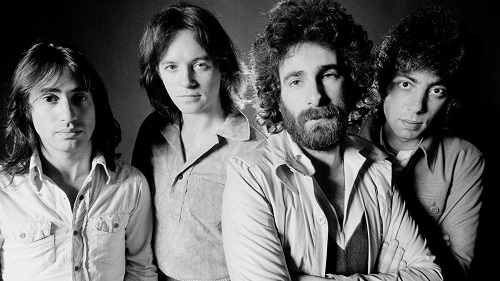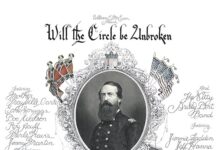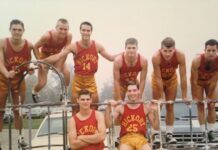Photos courtesy of Glass Onion PR
Reflect back on the great 1970s British bands and you’ll see 10cc more than measures up to their competition.
Equal parts irreverent and intellectual, the foursome didn’t strive to be like other hit makers. For members, It wasn’t about going glam or playing endlessly or grandiose a la prog stalwarts. Instead, Eric Stewart, Graham Gouldman, Lol Creme, and Kevin Godley used witticism and intricate storytelling to become the musical embodiment of O. Henry.
When they began the group came off as camp. Their earliest standout tracks — “Donna,” “The Dean and I,” “Rubber Bullets,” “The Wall Street Shuffle,” and “Silly Love” included — all boasted an infectious Mad Hatter quality about them, thanks to Creme’s nasal falsetto and the intense musicality of the other members. Like pranking schoolboys, 10cc carved out a niche on the British charts (11 Top 10 UK hits initially) as funnymen in rock, yet with an uncanny knack to weave stories with surprising endings.
They would never lose their humor, but in 1975 things got serious — at least commercially in the U.S. — for the group.
An anti-love song literally underscored by unheard of layered vocal production, “I’m Not In Love,” crossed over and brought 10cc one notch away from the apex of the Billboard Hot 100. Woeful in its execution, thanks to Stewart’s somber vocals, the track caught on and its accompanying album The Original Soundtrack elevated the band to status as a worldwide entity. Songs like “Channel Swimmer” would keep the O. Henry flame alive (“Well it’s cold down here in the water. It’s cold down here in the sea. Who’d be a channel swimmer? Only a fool like me … would forget he can’t swim.”). Yet for every jovial song they released (“Life Is A Minestrone”), an earnest one would jump up right behind it.
It would be this combination that sparked, in my opinion, the band’s greatest album effort, 1976’s How Dare You!.
“Now we were successful. We were growing concerned. We had people working for us, we had a road crew, we had all sets of expectations and anticipations,” Godley told me recently. “But from my perspective I just ignored it because I tried to write the best that I could for this album. I think we all did. It becomes a kind of responsibility hovering you at some point. We had nothing to lose when we began but now there was this sense of ‘We have to get this right,’ almost.
“We’re four different animals and we all thought in slightly different ways and that’s what kind of made it interesting. What was going through my mind was, ‘OK, we’ve done this so what we have to do now has to be better.’ What defines better, I’ve no idea, but it didn’t include duplicating what we had already done because that’s not really what 10cc was about or what my quarter of 10cc was about,” Godley adds. “Traditionally, what we had done up to that point was give ourselves a sort of window, usually about three to four months, with which to write and record. The album was essentially what we were able to achieve in that timeframe. So that always seemed like a sensible way to proceed.”
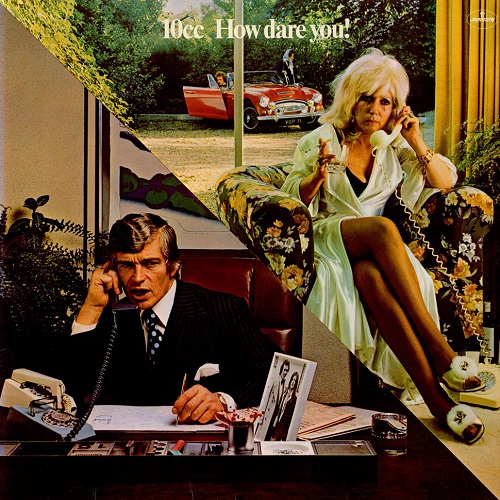
For 10cc, sustaining artistically meant going more outside of the box with new musical ideas. How Dare You! boasts several wonderful examples, including the militant, demagogic “I Wanna Rule The World,” the artistic line between integrity and fortune (“Art For Art’s Sake”), the multi-layered opus “I’m Mandy Fly Me,” and the six-minute tale of a relationship gone wrong, “Don’t Hang Up,” sung by Godley himself (“When the barman said, ‘Whatcha drinking?,’ I said, ‘Marriage on the rocks!’”).
“The first song Lol Creme and I wrote was ‘Somewhere In Hollywood’ on the Sheet Music album. Then we had written ‘One Night in Paris’ for the Original Soundtrack album,” Godley said. “I think…for us as writers, it opened us up to the possibility that what we were doing didn’t have to be four minutes long and it didn’t have to have a traditional structure, so we were just kind of writing like that anyway. The song that epitomizes that approach the most on How Dare You! is ‘Don’t Hang Up.’”
“Don’t Hang Up” would inadvertently become a prophetic track for 10cc. As the last song on the album, it’s also the last song featuring the classic line up of the band. Godley and Creme would soon leave to form their eponymous duo (famous for both albums and pioneering music videos like “Cry”), while Stewart and Gouldman retained the 10cc name and saw continued U.S. success with the Top 5 1977 hit “The Things We Do For Love.” Even with Godley and Creme’s departures, the band always paid tribute to their respective influences — one shining example being the classic reggae tale “Dreadlock Holiday” (“Don’t like Jamaica, I love her!”).
Reflecting on “Don’t Hang Up,” Godley says: “It’s not like the breakup of a relationship; it’s the breakup of the band even though it hadn’t happened yet. It’s a very odd thing but sometimes songs write themselves. I get that whenever I listen to it now. It’s not based on my life, it’s not based on any of our lives. It’s a story. It’s fiction but now somehow there’s an element of reality if you apply it to the band.”
“I’m Mandy Fly Me” is arguably 10cc’s greatest song, even surpassing the complex “I’m Not In Love,” given its delicate balance of balladry, rock, and storytelling jam-packed in a five-minute timeframe. The story reflects a narrator enamored with an airline poster, inspiring him to board a flight that ultimately crashes. The true brilliance of 10cc and this song lies in the following attributes:
- The opening bell ding and weaving in of the lyric, “No, you’ll never get me up in one of these again ‘cause what goes up must come down, down, down, down,” from an earlier song called “Clockwork Creep.” This sets the scene for the brilliant narrative within its first 25 seconds.
- The stunning visual of the omnipresent “Mandy” as stewardess and savior, respectively: “With a smile as bright as sunshine, she called me through the poster and welcomed me aboard,” followed then by, “I saw her walking on the water as the sharks were comin’ for me. I felt Mandy pull me up, give me the kiss of life, just like the girl in ‘Dr. No.’”
- Two intensely satisfying acoustic guitar solos punctuating the unfolding events of the crash, drummed up via Godley’s ingenuity.
“During the Original Soundtrack album and How Dare You!, we started to hybridize a bit more — the two basic writing duos began to switch partners a little bit more and experiment a little bit more,” Godley told me. “I always felt it was my duty to throw a spanner in the works. It was probably something to do with my art college background. I always felt that anything that was too predictable wasn’t really where we needed to be. We thrived on disruption in a way — or at least I did — so anything that I may have added to that track would have been with that in the back of my mind.”
10cc would sustain for five more albums before Godley and Creme came back into the fold. Godley says there weren’t any “bad vibes” or arguments that prompted the band’s initial member split.

“Creatively, I think we were just on the tipping point of having peaked,” he said. “My favorite album was Sheet Music because we still didn’t quite know what we were doing. I always found that to be the best environment to be creative.”
Living in Ireland, Godley is set to release his first solo album, Muscle Memory, a project begun in 2017 and built entirely from crowdsourcing and the instrumental inputs of musicians of all makes and genres. Godley had sent two recorded instrumental tracks (from composers he still hasn’t met) to direct-to-fan platform PledgeMusic with requests to write melodies and lyrics and turn them into songs. Overall, Godley received 286 instrumentals to assist with his album. Despite PledgeMusic declaring bankruptcy and the project initially stalling, Godley ultimately received additional funding to get the album out to the masses.
“I would get three or four [instrumentals] a day and then nothing and then 12 and then one over an extended period of time. It didn’t stop,” he said. “It just kept coming and it still does. That’s the crazy thing.”
Godley adds “it’s certainly possible” that future albums may be created based on the instrumentals received. Despite the pandemic, Godley is staying busy with a new Orson Welles-inspired screenplay and prepping a 30th anniversary box set of his renowned One World One Voice environmental musical project.
He adds the title Muscle Memory is not a lark; it’s reflective of his needing to deep dive into the annals of his brain to recall his musical talents.
“I was always concerned as to how my DNA would remember how to do it,” he says. “It did.”
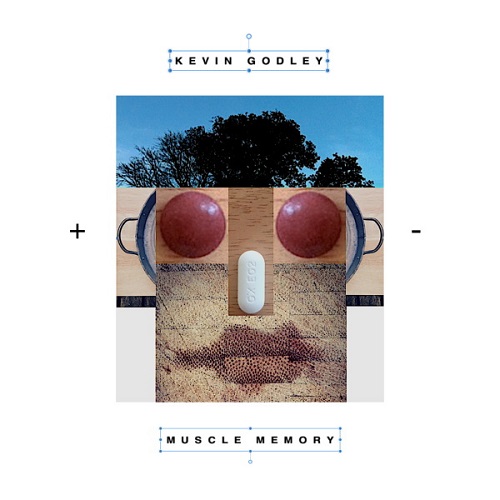
***
Share your feedback and suggestions for future columns with Ira at vinylconfessions84@gmail.com.


